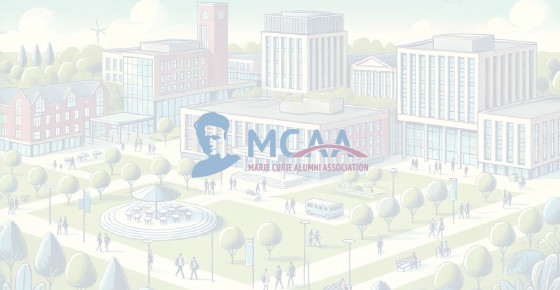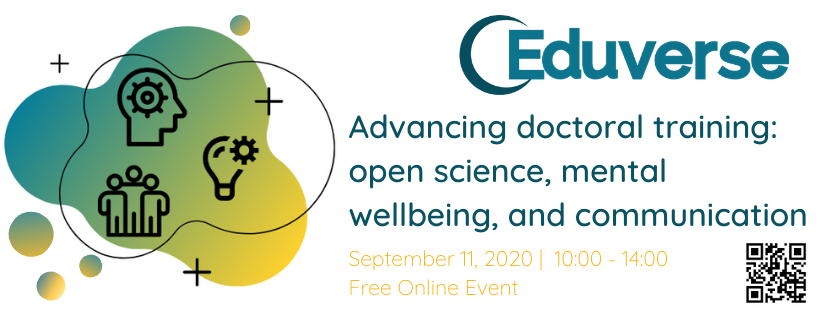
On Site
Advancing doctoral training: open science, mental health, and communication
- General Info
Event Start Date
11 Sep 2020
Event End Date
11 Sep 2020

About the Event
In today’s growing competitive landscape in research careers, it has become more important than ever to advance the skills needed for a sustainable career in research. Researchers need to be experts in research management, manage stress, and capable communicators in order to have a long, successful career in research. Moreover, in today’s rapidly innovative global society, it is imperative to build international and interdisciplinary networks among peers. This event introduces the OEduverse Project, which provides opportunities for European graduate students to network alongside earning interdisciplinary and transferable skills that are beyond their specialisation yet demanded by their future employers. We welcome anyone interested in advancing sustainable research careers, especially those working directly with PhD students to attend this event.
Program
Morning Session (10:00 - 12:00)
Moderator of the day: Dr. Scott Harrison, Chair, MCAA German Chapter
10:00 - 10:10 Welcome Address
Dr. Christian Weber, Oeduverse Project Coordinator, Institute of Knowledge-Based Systems and Knowledge Management (KBS & KM), University of Siegen
General introduction to OEduverse and the project consortium and today’s speakers.
10:10 - 10:30 Keynote
The state of doctoral training in Europe: where are we today and the direction forward.
Mr. Mathias Schroijen, Project Manager - Professional development and training for researchers at the Université Libre de Bruxelles (ULB)
This talk will address the current status of doctoral training in European universities, specifically touching on the gaps in open science, mental wellbeing, and science communication. Mr. Schroijen will share his vision on how doctoral training can be redesigned so that it is more engaging, substantial, and cohesive for what early stage researchers need in their future.
10:30 - 11:15 Fireside Chats and Panel Discussion
Sustainability of careers in research and science
Dr. Gábor Kismihók, Research Group Leader, Leibniz Information Centre for Science and Technology (TIB)
Based on the recently published ‘Declaration on Sustainable Researcher Careers’, this talk will show the most important elements of the current structural challenges when it comes to the development of sustainable careers for researchers. It will also discuss important and relevant bottom-up, grassroots initiatives, which are fundamental to change this currently unfavorable situation for early career researchers.
Establishing, maintaining and sustaining mental wellbeing; individually, within teams and within the academic system for career researchers.
Ms. Jo Harney, M.Sc., Reg. Psychol., PsSI, M.Sc., Clinical Supervision, Groups and Training Manager at Trinity College Dublin
Today, 25% of PhD students state their mental health is a concern. The mental wellbeing of researchers is not only impacted in the professional relationships they form but also in the culture with which they work. This talk will inspire grassroots changes to workplace culture that nurtures positive mental wellbeing which leads to better working relationships among researchers at all levels.
Immersive storytelling in research and reimaging the world of academia
Ms. Petra Ardai/ Artistic Director of SPACE, Amsterdam-Budapest
specialized in documentary theatre, future scenarios and immersive storytelling,
Creativity, critical thinking, and communication are essential skills researchers need in our ever changing world full of new challenges. Bringing immersive storytelling to the research community trains these skills and empowers participants in formulating their future plans and needs towards each other, the academic world and society. Working with the methodology of art and storytelling, the course creates space for new ideas, collaboration and engagement.
The future of doctoral education
Dr Alexander Hasgall, EUA Council for Doctoral Education, European University Association (EUA)
11:15 - 11:45 Q&A
Speakers and Audience
---
Afternoon Session (12:30-14:00)
12:30 - 12:40 Morning Recap
Dr. Scott Harrison, Chair, MCAA German Chapter
12:40 - 13:15 Breakout Discussions: Training needs and implementation for doctoral researchers
-
Open Science, Moderator: Dr. Christian Weber
-
Mental Wellbeing, Moderator: Dr. Gábor Kismihók
-
Communicating Research, Moderator: Dr. Scott Harrison
13:15 - 13:45 Takeaways
Dr. Scott Harrison, Chair, MCAA German Chapter
14:00 - 15:00 MCAA German Chapter Meeting
Speakers
Dr. Christian Weber is a post-doc researcher with the Institute of Knowledge-Based Systems and Knowledge Management (KBS & KM), University of Siegen, Germany. Christian has defended his PhD thesis with the University of Budapest, Hungary. The focus of his PhD was on developing a semantic and structure-aware concept importance measure for domain knowledge within knowledge maps to guide digital learning. He received his Diploma in Computer Science in Electrical Engineering Application from the University of Siegen, Germany. He is researching on the exploitation of evolving knowledge maps for an ongoing industrial and educational digitalization and is active for that in national and international funded research projects (DFG, H2020, Erasmus plus) and direct industrial collaborations.
Mathias Schroijen is a member of the Postgraduate Office at the Université Libre de Bruxelles (ULB). As a project leader he is responsible for the development of transferable skills training programmes and career development services for researchers. Mathias has a research background in health psychology and is currently finalizing his PhD in respiratory psychophysiology (KU Leuven). Besides his research, he focused on PhD community building at the local level (PhD Society at KU Leuven), the construction of training and career development services at the institutional level (project manager MSCA-Cofund IF@ULB) and the representation of early career researchers at the European level (secretary of Eurodoc).
Dr. Gábor Kismihók is the head of the Learning and Skills Analytics Research Group at the Leibniz Information Center for Science and Technology (TIB) in Hannover, Germany. He is also the Chair of the Research Funding Working Group and the Researcher Career Management Task Force at the Marie Curie Alumni Association. His core research focuses on matching processes between individuals, education (learning) and the labour market, using novel technologies and datasets. He has published his research in a number of international peer reviewed journals and books in the area of Learning Analytics and Technology Enhanced Learning. Gábor also has extensive experience with European research funding (e.g. H2020, H2020 MSCA, Erasmus Plus).
Ms. Jo Harney - is a Counselling Psychologist in the position of Training and Groups Manager at the Student Counselling Service in Trinity College Dublin, Ireland. She has achieved a Masters in Counselling Psychology and a Masters in Clinical Supervision. She specialises in working with students supporting them to achieve mental wellbeing to reach their potential during their academic careers. She has significant experience producing and delivering training and therapeutic groups in the field of psychology and mental health. Her main areas of interest and expertise are compassion focused therapy, clinical supervision, group therapy and training.
Petra Ardai is theatre-maker, teacher and writer. She is the artistic director of the Amsterdam and Budapest based art collective SPACE. Petra has wide experience in documentary theatre and immersive collaborative storytelling in various media. She produces interactive performances, multimedia installations, online art, living heritage apps and instant visionary fiction. She gives workshops and lectures. Petra is specialized in future scenarios and builds imaginary worlds around the question: ‘Who owns the Future?’ She collaborates with cross-sector partners from the field of art, science and NGO’s.
Dr. Alexander Hasgall heads the EUA Council for Doctoral Education and is responsible for a network of more than 250 European Universities from 36 countries, dedicated to the further development and strengthening of doctoral education and research training in Europe. Alexander studied philosophy and history at the University of Zurich and the Free University of Berlin. He received his Doctorate in History at the University of Zurich on the history and discourse of transitional justice in Argentina. Outside of the higher education sector, Alexander acquired different experiences in the NGO-Sector, market research and as a freelance journalist.